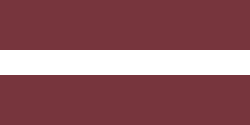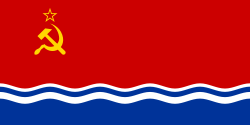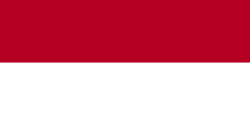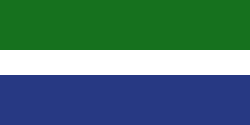This article needs additional citations for verification .(November 2023) |
The following is a list of flags of Latvia .
This article needs additional citations for verification .(November 2023) |
The following is a list of flags of Latvia .
| Flag | Date | Use | Description |
|---|---|---|---|
 | 2019–present | Digital flag | Dimensions: 10 horizontally and 2:1:2 vertically. |
 | 1990–present (1940–1990 de jure ) | State flag and civil ensign | Dimensions: 10 horizontally and 2:1:2 vertically. |
| Flag | Date | Use | Description |
|---|---|---|---|
 | 1923–1940 1995–present | Presidential standard | |
 | 1995–present | Speaker of the Saeima | |
 | 1995–present | Prime minister's standard | |
 | 2002–present | Defence minister |
| Flag | Date | Use | Description |
|---|---|---|---|
| | ?–present | Flotilla commander's pendant | |
| | ?–present | Squadron commander's pendant | |
 | ?–present | Division commander's pendant | |
| | ?–present | Warship pendant |
| Flag | Date | Use | Description |
|---|---|---|---|
 | 1673–present | Flag of Riga | |
 | 1937–present | Flag of Daugavpils | |
 | 1938–present | Flag of Jelgava | |
 | 1990–present | Flag of Jūrmala | |
 | 1938–present | Flag of Liepāja | |
 | Flag of Ogre | ||
 | Flag of Rēzekne | ||
 | 1993–present | Flag of Ventspils |
| Flag | Date | Use | Description |
|---|---|---|---|
  | 1953–1990 | Second flag of the Latvian SSR (obverse and reverse) | All flags of the constituent republics of the Soviet Union did not bear the hammer and sickle on their reverse side. |
 | 1940-1941 1945–1953 | First flag of the Latvian SSR | Red flag with the gold hammer and sickle in the top-left corner, with the Latin characters LPSR. |
 | 1919–1920 | Flag of the short-lived Latvian Socialist Soviet Republic | |
 | 1919 | Flag of the Iron Division | |
 | 1917 | Reconstructed flag of the 5th Army Congress in Daugavpils, used by Latvian soldiers on May 17, 1917 | A red flag with a white band at the middle (1:1:1 vertical dimensions), with a heart symbol pierced with a sword. The inscription in old orthography reads God bless Latvia (Dievs, svētī Latviju). |
 | 1917–1918 | Flag of the Iskolat | |
 | 1808–1918 | tricolour| | |
 | 1820–1918 | tricolour| | |
 | 1562–1795 | Flag of the Duchy of Courland and Semigallia | |
 | 1650s–1680s | Merchant ensign of the Duchy of Courland and Semigallia | Known as "Crab Flag" (Krabju karogs)[ citation needed ] |
 | 1562–1795 | Merchant ensign of the Duchy of Courland and Semigallia | |
| Flag | Date | Party | Description |
|---|---|---|---|
current | |||
 | 1990–present | Latvian Green Party | |
 | 2010–present | Latgale Party | The flag was created as an unofficial flag of the historical land of Latgale, gaining widespread use and later adopted by the party. |
 | 2003–present | National Power Unity | |
former | |||
 | 2006-2011 | All for Latvia! | |
 | 1946–1949 | Communist Party of Latvia | Requires better flag. |
 | 1929–1940s | Mazpulki lv | Latvia 4-H section. |
 | 1995–2000s | Pērkonkrusts | |
 | 1933-1944 | ||
| Flag | Date | Use | Description |
|---|---|---|---|
 | 1988–present 1923–1941 | Flag of Livonians | A tricolor flag with green at top, a narrow white band at the middle, and blue at the bottom. |
 | 2010–present | Flag of Latgalians | A dark blue flag with a narrow white band at the middle. Adopted as official flag of Latgale in April 2023. |
 | 2000–present | Flag of Selonians | A tricolor flag with red at top, a narrow white band at the middle, and green at the bottom. Adopted as official flag of Selonia in April 2023. |
 | 2023–present | Flag of Semigallians | A dark green flag with a narrow white band at the middle. Adopted as official flag of Semigallia in September 2023. |
 | 1991–present 1918-1941 | Flag of Baltic Germans | A bicolor flag with blue at the top and white at the bottom. |
 | 2005–present | Flag of Latvian Russians (rarely used) | A light purple flag with a narrow white band at the middle. |
| Flag | Date | Use | Description |
|---|---|---|---|
 | 1917 | Jānis Grosvalds' proposal, intended for the Latvian Riflemen in their advance towards Jelgava [3] | |
 | Diplomat Oļģerts Grosvalds' proposal, intended for the Latvian Riflemen [4] [5] | ||
 | 2024 | Flag of the Historical Latvian Land of Kurzeme (Courland) proposed by A. Kuzmins. [6] [7] [8] [9] | A tricolor flag with red at top, a narrow white band at the middle, and black at the bottom. |
 | Flag of the Historical Latvian Land of Vidzeme proposed by A. Kuzmins. [6] [7] [8] [10] | A tricolor flag with red at top, a narrow white band at the middle, and gold at the bottom. |
| Flag | Date | Use | Description |
|---|---|---|---|
 | 1836-1947 | Flag of Riga Steamship Company de | A red five-pointed star, off-center towards the flag pole, on a white field. |